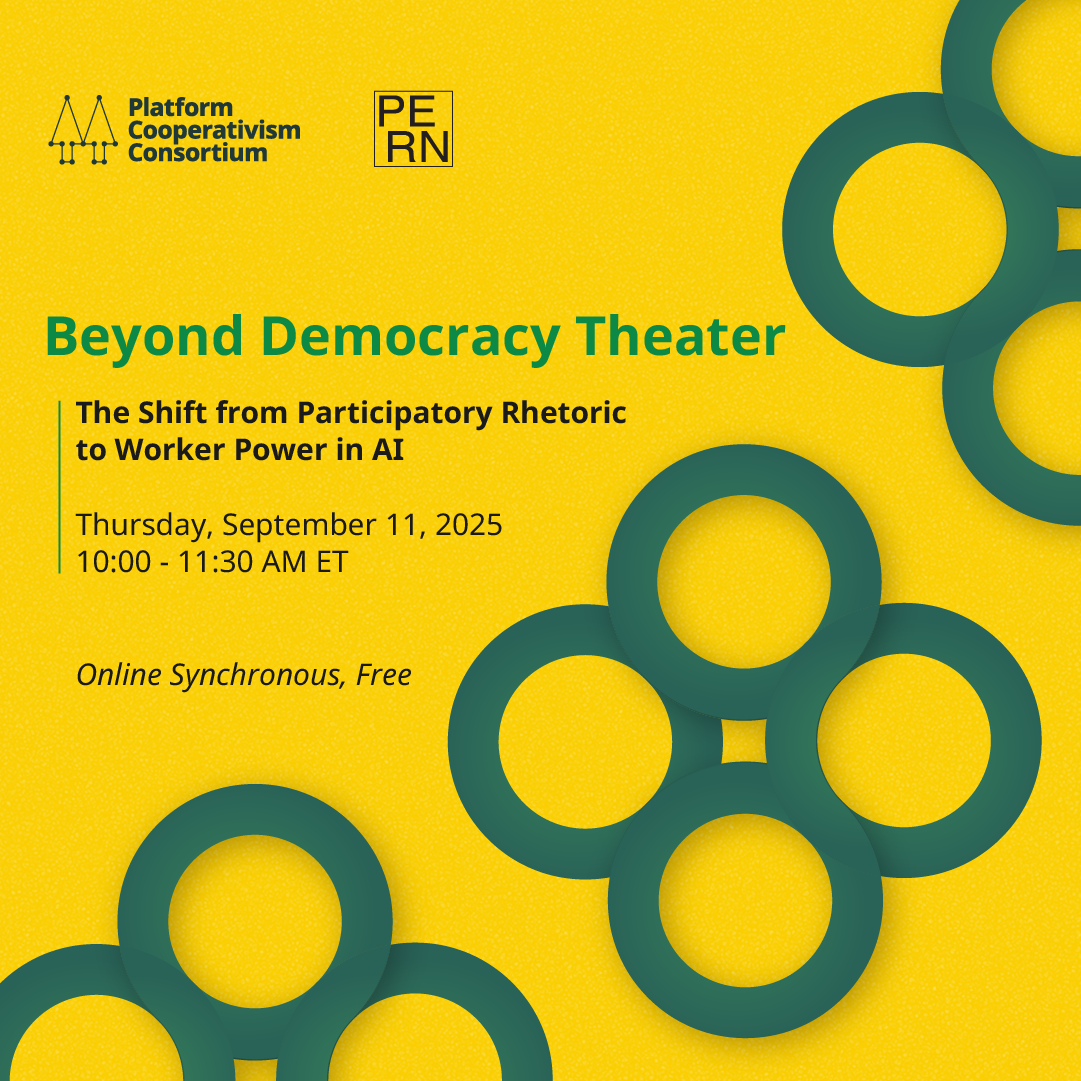
Beyond Democracy Theater
The Shift from Participation to
Worker Power in AI
Thursday, SEPTEMBER 11, 2025
10:00 – 11:30 AM ET
Online Synchronous, Free
- REGISTRATION REQUIRED here
What’s often described as “worker-led AI” is less a demonstration of power than a performance of it—a theater of democracy that rarely shifts control. As algorithmic systems quietly reshape how labor is organized, managed, and valued, consultation often replaces control, and inclusion becomes a stand-in for agency.
This ICDE event builds toward the November 2025 conference in Istanbul on cooperative AI, extends themes from a recent article on the possibility of community ownership of AI, and connects to a related course now enrolling at The New School.
Three Scenarios
Convened by 2025/2026 ICDE fellow Dr. Linda Huber, this ICDE event examines three scenarios in which those most affected by AI are attempting to shift its design, governance, and ownership—some of whom will be at the table, speaking from direct experience.
The Participatory Scenario features technologists collaborating with communities to build AI systems accountable to workers. These efforts can surface local knowledge and expose algorithmic harms, but struggle against the deeper hierarchies that shape development priorities.
The Bargaining Scenario looks at organized sectors—journalism, healthcare, data labeling—where unions are pushing to embed protections against algorithmic harms into contract language. But legal constraints, uneven leverage, and the volatility of technical systems limit what such provisions can deliver.
The Ownership-from-Below Scenario turns to worker-run cooperatives—grassroots efforts to reclaim infrastructure, governance, and use, ranging from repurposing corporate AI tools under cooperative control to building shared infrastructure from scratch. These models point to new possibilities, but still operate within an ecosystem dominated by proprietary systems and concentrated control over data, computing power, and capital.
The event opens with sharp dispatches from the field—on participatory design, union contract strategies, and cooperative AI infrastructure—each posing urgent questions about how real worker power might be built. Brief scenario spotlights will lead into a discussion probing both promise and limitation:
– Can participatory design shift power without changing deep structural constraints?
– Are contracts enough to check opaque systems– and what levers remain for unions beyond the bargaining table?
– What autonomy can worker cooperatives realistically claim amid privatized, centralized infrastructure?
Voices in the Conversation
This event brings together people building alternatives, challenging AI systems from within, and confronting their impacts on the ground.
Dan McQuillan, author of Resisting AI and professor at Goldsmiths, offers an abolitionist take—and a vision for worker councils in the algorithmic age.
Emily Tseng (Microsoft Research / University of Washington) is co-designing a cooperative LLM alongside journalists, retooling AI for the newsroom rather than against it.
From Nairobi, Joan Kinyua of the Data Labelers Association is helping shape a code of conduct to protect workers often left out of the AI conversation.
Anna Iovine (Mashable / NewsGuild of NY) helped craft contract language aimed at shielding writers from AI’s most extractive effects.
Dorleta Urrutia-Onate of Mondragon University, an 2025/2026 ICDE Fellow, will share early efforts to develop a value-aligned AI tool that supports Mondragon, the iconic Basque cooperative federation in meeting the demands of the EU AI Act.
Trebor Scholz, Founding Director of PCC and professor at The New School, researches the viability of alternative ownership structures for AI.
“Beyond Democracy Theater. From Participation to Worker Power in AI” is convened by Linda Huber, 2025/2026 ICDE Fellow and postdoctoral researcher at Swarthmore College, whose work explores how worker councils and cooperatives might disrupt the centralized grip of AI infrastructure.
The event is presented in partnership between the Institute for the Cooperative Digital Economy at the Platform Cooperativism Consortium (PCC), The New School, the Platform Economies Research Network (PERN), and the ARC Centre of Excellence for Automated Decision-Making and Society (ADM+S).
Readings
- How Hollywood writers triumphed over AI – and why it matters (Anguiano and Beckett, The Guardian, 2023)
- As AI nurses reshape hospital care, human nurses are pushing back (Perrone, NBC Bay Area, 2025)
- Power to the people? Opportunities and challenges for participatory AI (Birhane et al, Equity and Access in Algorithms, Mechanisms, and Optimization, 2022)
- Is Another AI Possible? Platforms, Political Economies, and Alternatives (Rahman, Media, Inequality, and Change Center, 2025)